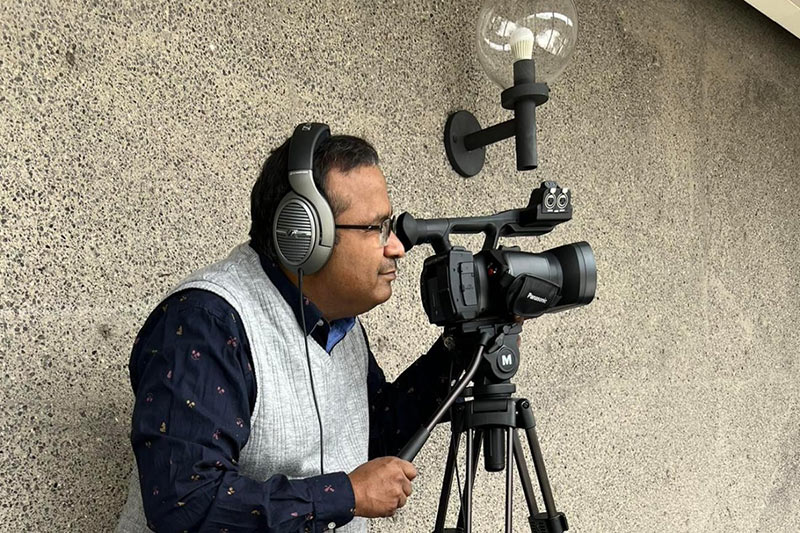Christopher Rajkumar – ‘Belonging’ is how he feels and what he studies

By the time you’re reading this, Christopher Rajkumar will have learned whether he’s a new PhD student at LSTC. But for now, he is soon to be an MA graduate.
Exactly a year to the day Rajkumar and his wife Sugirtha arrived in Chicago for him to pursue his studies, we sat down in the Grand Hallway to reflect on his academic journey so far.
When he arrived at seminary, it was not his first visit to the United States or even to LSTC. He had been to the U.S. four times, all for conferences, and had come through Chicago to visit his Indian friends at LSTC. At two of the four conferences he had been a speaker on a topic he’s pursuing for a PhD in theology and ethics with a special focus on “just, inclusive and belonging in the church.”
“Belonging is a culture not a sign or a symbol,” he said. “Cultivating a culture of belonging should be inculcated among the pews to consider everyone as belonging to each other, and should be the mission of the church.” His life philosophy is, “I belong to you, you belong to me, and we belong to each other.”
When Rajkumar visited LSTC the first time, he met with Rob Worley, director of the Language, Resource and Writing Center, who asked him, “Why don’t you take up your study here?” faculty member Peter Vethanayagamony also encouraged him to consider doing his PhD work at LSTC when Rajkumar was working for the National Council of Churches in India.
Rajkumar served the NCC 10 years as the executive secretary for mission, ecumenism and diaconia, allowing him to contribute to the mission and ministries of several international ecumenical movements and organizations, including World Council of Churches, Lutheran World Federation and the United Nations.
But because of more than a decade gap from academics, he was advised to first get his MA, which he said was good advice; he called it a “refreshing experience” to be in the MA program.
This year allowed him to adjust to academia in a new country, and to living here. Because they had to quarantine in their campus home when they arrived, it was weeks before he and his wife met anyone faceto-face. Still, he says the welcome was tremendous.
LSTC is family
“The community made us feel we belong to a family. We had calls from people we don’t know saying they heard we had arrived and saying, ‘How are you both doing?’ and ‘Do you need anything?’ It made us to feel, wow, what a great community.”
Since all classes were online last academic year, they continued to be isolated. Still, people reached out. It wasn’t unusual for someone to ask him in the chat feature during classes on Zoom, “How are you doing? or “Do you need anything?”
“It made us feel this is a family,” he said.
Family is exactly what they needed. The hardest part of leaving India was leaving their two daughters, Rushenka (age 21) and Shyreeti (age 18 and in boarding school and still financially supported by her parents). To pay for seminary, make ends meet and even support family at home, many international students work at the seminary. Rajkumar works for the Marketing and Communications team taking photos, editing video and writing.
In addition, he manages the seminary’s Duty Free shop (donated household and clothing items to help students, especially international students) and Katie’s Closet.
“Duty Free and Katie’s helped us set up our house and were a huge part of our life the first three months especially. They reduce the burden for new students. When you are hunger-free most of your problems are solved,” he said. Churches, individuals and families, and other partners donate to them regularly and there is a “Katie’s Closet at LSTC” Facebook group.
In addition to the closeness of classmates, Rajkumar says the inter-faith programs, Christian-Muslim conversations, the Antiracism Transformation Team, LRWC, public church emphasis, disability theology, and preaching courses have taught him different perspectives to his philosophy and theology of belonging.
“LSTC is known for its creative, contextual, inclusive, belonging and bold theological vision,” he said.
Original article published in the Winter/Spring 2022 Epistle Magazine; written by Julie Sevig